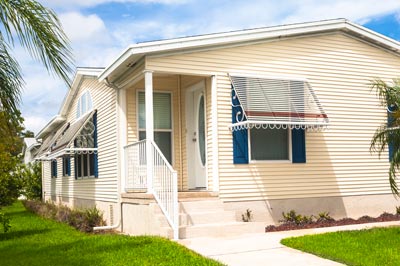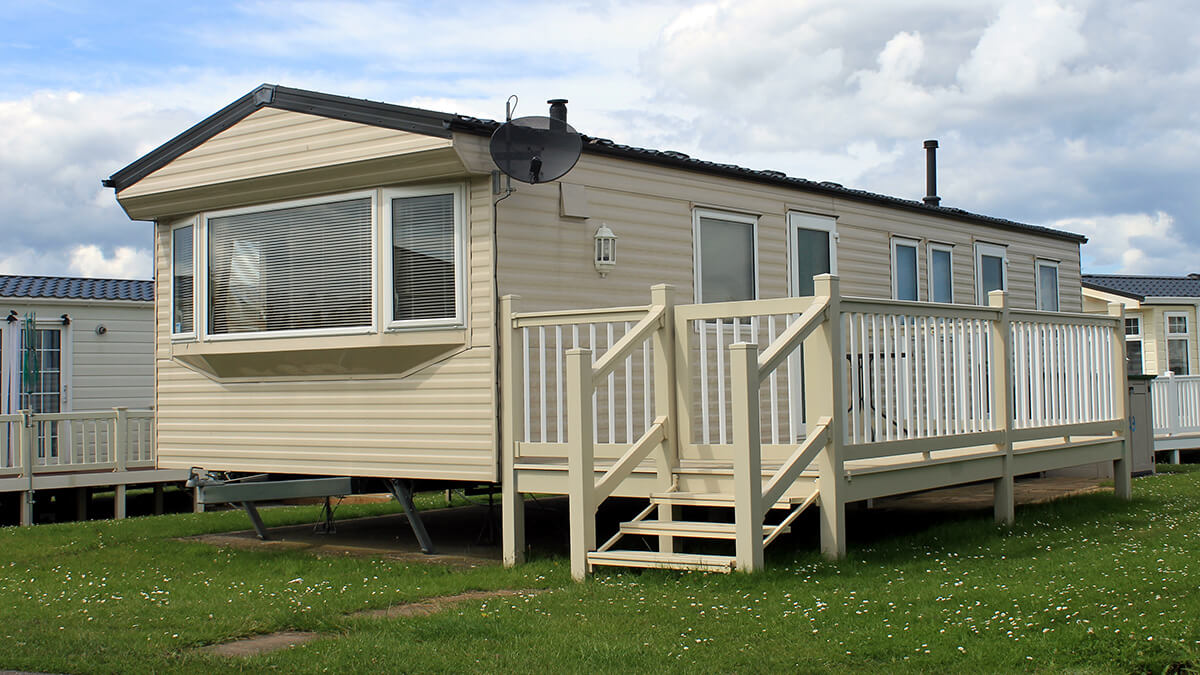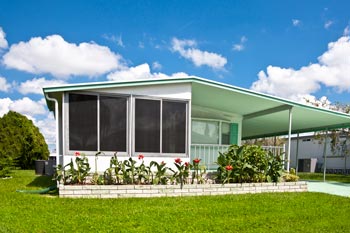Choosing the right location
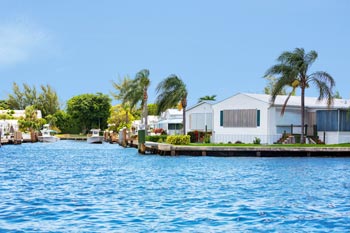
Just as there is diversity in the people who live in manufactured homes, there is a wide choice of home locations.
Are you looking for the amenities, services and security of a manufactured home rental community? Would you rather experience the freedom associated with owning your own land? Or, do you want to buy your home and land together in a planned subdivision?
Choosing the right location for your manufactured home not only affects your lifestyle, it affects the future value of your home. That's why you should take your time, look at more than one area, ask questions, be cautious and consider the advantages and disadvantages of the location you select.
Manufactured Home Communities
Manufactured home communities offer conveniences, recreational facilities, security and a wide range of services for people of all ages. These neighborhoods often create the same atmosphere as other well planned residential developments with gated entrances, landscaped public areas, wide city streets, curbs and sidewalks.
When you consider living in one of today's manufactured home communities, you are in good company. About half of all new manufactured home buyers decide to place their home in a rental community. Some people are looking for security and the flexibility to leave their home for long periods without worry. Others want freedom from lawn maintenance and the opportunity to make new friends while participating in planned park activities. Whatever their reasons, most buyers are very satisfied with their choice.
Although many parks include features such as pools, clubhouses, cable television, playgrounds and storage facilities – there can be differences between them. It pays to visit several parks in the area where you want to live to compare services, amenities, rental agreements, installation costs, rules, regulations and restrictions.
Important Questions to Ask
While visiting a park talk with the park manager and be sure to ask the following questions before making a final decision to move into the community
- What services and amenities are included in the monthly home site rental?
- How often is lawn and landscape maintenance provided?
- Who is responsible for snow removal, garbage collection and street repairs?
- What are the community rules, regulations and restrictions?
- Is a written lease required? For what length of time?
- How are rent increases handled?
- Who installs my home? The retailer or other professional? The park?
- How long will it take for site preparation and installation?
- Are there charges for installation and utility connections?
- What are insurance and home inspection requirements?
- Will there be special requirements if I sell my home?
- Is there a minimum age requirement (if a retirement park)?
- Does the lot rent cover the property taxes?
- Where are the fire hydrants located?
- Do the homes have individual light posts?
- How closely are the homes spaced (for safety and privacy purposes)?
- How long can guests stay?
The Neighborly Approach
Drive and walk through the park at different times of the day and night. Does it seem like a secure, neat, clean and well-maintained environment? Stop and talk with a few park residents during your visit and ask them a few questions about the community and park management. For example:
- Is it a friendly neighborhood?
- Are you satisfied with lawn and pool maintenance?
- Do you participate in organized clubhouse activities?
- Are pets welcome? What about visitors?
- Are storage facilities for boats and RV's adequate?
- Do you think the park manager is qualified, professional and friendly?
- Are there volunteer community patrols?
- Have you experienced a rent increase? How often?
- Are you pleased with the lifestyle in this manufactured home community?
- Is there a homeowner's association?
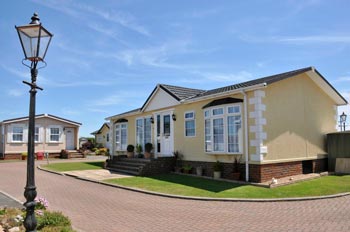
Private Land
Living in a rental community isn't for everybody. Many manufactured home buyers prefer to place their homes on land they already own or are planning to buy. In fact, recent statistics reveal that just under half of all manufactured homes are located on private property.
Total ownership, freedom from park rules and regulations and the elimination of monthly lot rent are all convincing reasons to place your new manufactured home on private land. Although this is an attractive idea, there are practical matters to consider, such as zoning, restrictive covenants, water, utilities and sewerage.
Zoning
Today, more and more rural and suburban residential land is zoned appropriately to allow manufactured homes, but zoning can still be a problem in some areas. Because zoning regulations vary greatly, you should do some homework before buying a home site on private property.
The first step should be to check with building and zoning officials or the local planning department. Expect to invest some time and be prepared to ask the following questions:
- How is the property currently zoned?
- What are the requirements for placing a manufactured home on the property?
- Are there any restrictions? If so, what are they?
- Is the size and appearance of a manufactured home regulated?
- When will a legal description of the property be required?
- How long will it take to get a permit?
If your request for a permit is turned down, don't give up. Apply for a variance. Ask the zoning officer to give you the reason – in writing – why the permit was not issued.
Discrimination against manufactured housing is not permissible in many states and localities. Local codes can be revised to allow manufactured homes as long as they are placed on a permanent foundation and meet the same construction standards as site-built homes.
Restrictive Covenants
Before buying any piece of land be sure to look carefully at the property deed since it controls how the land can be used. For example, does the deed have limitations or restrictive covenants requiring the land to be used only for certain purposes?
Restrictive covenants can be complicated and difficult to understand, so it's a good idea to ask an experienced real estate attorney to look over the property deed. Since the title search is another document that can describe limitations, ask your attorney to review it as well. The cost for this service may save a lot of money and headaches down the road.
Water, Utilities and Sewerage
Never buy land without a proven source of adequate water, which means a plentiful, potable supply that is available year-round. Not all areas have local water lines and you may have to depend on a well. If the property has a well, have a pumping yield test performed to be sure it provides enough water.
If the land you want to buy has no visible water, consider making the sale contingent on the ability to drill a well that produces a sufficient amount of water. Check costs with a local well-drilling company and ask if success is guaranteed. Ask how deep the well should be drilled? And, contact the local health department about water quality in your area.
Make sure you have access rights for public utilities. Although your new manufactured home is delivered complete with plumbing, electrical and heating systems, it still must have be connected to utility services. Utility hookups can add an unexpected expense, so ask public utility companies how much connections will cost.
If there is a public sewer system available, ask if it's possible to hook up to it and what the costs will be. If you need to rely on a septic system you must obtain a permit to install a septic tank. This will require a positive percolation test. If the ground does not allow adequate seepage, you may not be allowed to install sewerage facilities. For this reason, many buyers ask for a contingency clause in the contract that makes the sale of the land subject to getting a permit to install a septic tank.
Check with local authorities about obtaining a permit and installing a septic tank. For more information contact the health department about environmental issues involved with the use of a septic tank.
Planned Subdivisions
This concept represents a departure from both traditional rental communities and private property placement of manufactured homes. In a planned subdivision the home and land are bought together and the developer is responsible for your home's installation.
Planned subdivisions are gaining popularity with manufactured home buyers, developers and financial institutions. The shift toward land/home purchase and real estate type financing gives buyers still another option when choosing a location. But just as you would do when considering a rental community or private land, ask about costs, services and covenants before you buy in a planned subdivision.
Part of the trend toward manufactured home planned subdivisions is due to the amenities they offer, such as a clubhouse, swimming pool or arts and craft center. They also closely resemble site-built residential communities by providing curbs, paved streets and driveways, streetlights, underground utilities, and landscaped yards with irrigation systems.
Other Land/Home Neighborhoods
In addition to the planned subdivision, other neighborhoods where the land and manufactured home are bought together include planned-unit developments, condominiums or cooperatives. The planned-unit development (PUD) is a community where the resident owns the home, the land and a fractional interest in certain common areas.
Condominiums are, in essence, a smaller, reduced version of a planned unit development. A Cooperative can be formed when a group of residents acquire a manufactured home park and each resident owns a fractional interest in the entire community.
